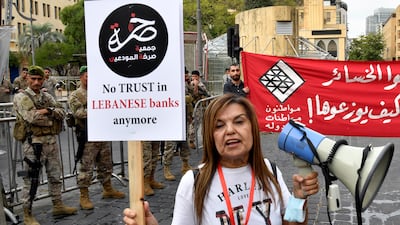A US court ruling that cases against Lebanese commercial banks can be tried outside Lebanon has given hope to depositors who have been unable to access their frozen savings since the start of the country's economic crisis.
“The fact that foreign courts are establishing jurisdiction over cases against Lebanese banks is a very positive step for depositors because the ruling class has paralysed Lebanese justice," said Fouad Debs, a lawyer and the co-founder of Lebanese Depositors Union.
According to Reuters, the decision came after a complaint filed by a Lebanese family in December 2020 against Bank Audi, one of the country's biggest banks, was first dismissed by a federal district court's decision on the grounds that local courts had “exclusive jurisdiction” to hear cases against Lebanese banks.
Since the financial crisis began, banks have imposed draconian controls on withdrawals and transfers in dollars, freezing accounts and leaving depositors able to access only a fraction of their savings in the Lebanese lira, which has lost more than 90 per cent of its value.
In the absence of a law on capital control, depositors have contested the legality of these informal restrictions before foreign and local courts in a bid to unlock their savings.
“The Lebanese judiciary is not taking the depositors' issue seriously: most of our cases have not even been ruled on, because of the ongoing strikes, but also for political reasons to protect banks and bankers," Mr Debs said.
Some depositors have turned to foreign courts to get justice and unlock their savings, such as in France and in the UK, as both countries have established jurisdiction on cases brought against Lebanese banks, sometimes with positive outcomes.
In December 2021, a French court ordered a Lebanese bank to pay $2.8 million to a client living in France, while in March, a London ruling ordered two major Lebanese banks to pay $4 million to a depositor.
But this is the first time a US court has said it has jurisdiction in such cases. “This is unprecedented, but this a first step, and not a final ruling. It does not mean the depositors are getting their money back," Mr Debs said.
But the difference between foreign and local justice highlights inequality among depositors.
“The successful cases are usually the ones bought up by the wealthiest because not everyone can pay a lawyer to defend their rights. Foreign courts are also not automatically competent for every case and usually require the plaintiffs to reside outside Lebanon," Mr Debs said.


